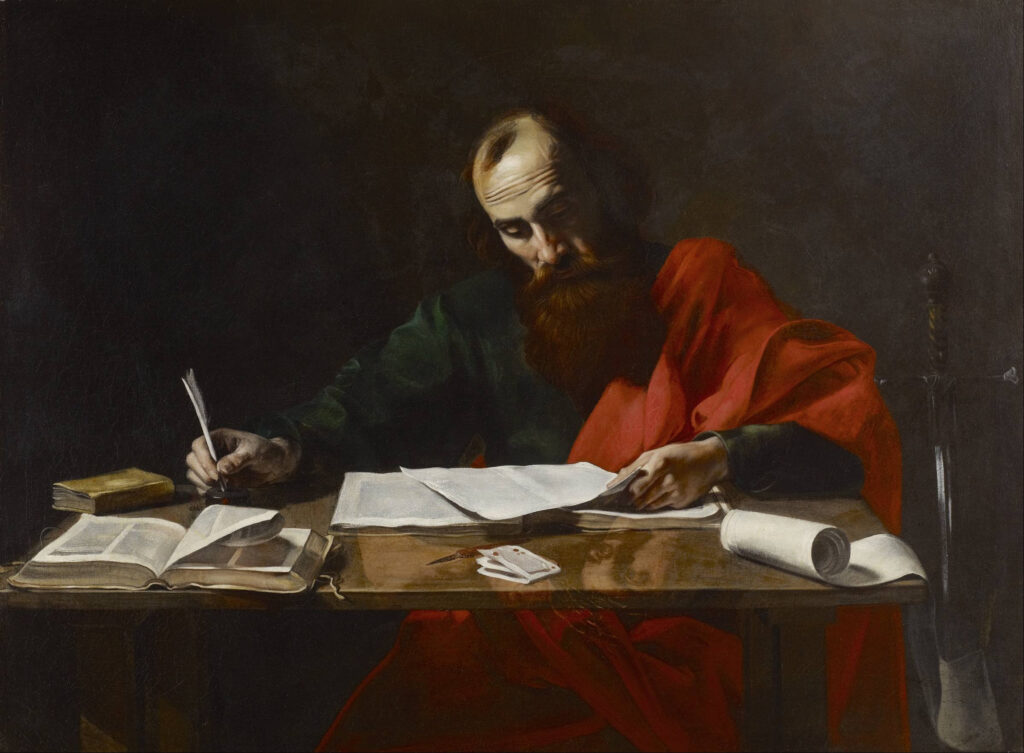Note: If you wish to receive, via e-mail, (1) my weekly newsletter or (2) daily copies of these posts, notify me at rrbates1951 at gmail dot com and I will send it/them to you. I promise not to share your e-mail address with anyone. To unsubscribe, send me a follow-up email.
Spiritual Sunday
I had a jolt today as I was looking over today’s epistle reading, from St. Paul’s second letter to the Corinthians. One of the passages, I realized, gets parodied—or at least alluded to—in Midsummer Night’s Dream. This give us an opportunity to explore in some depth what Shakespeare is up to.
Paul is writing about the difference between human wisdom and God’s wisdom. Only those who have experienced the Holy Spirit, he writes, can “understand the gifts bestowed on us by God.” By contrast, those who rely only on the senses, the intellect, and the heart are “doomed to perish.” Here’s the passage:
Yet among the mature we do speak wisdom, though it is not a wisdom of this age or of the rulers of this age, who are doomed to perish. But we speak God’s wisdom, secret and hidden, which God decreed before the ages for our glory. None of the rulers of this age understood this; for if they had, they would not have crucified the Lord of glory. But, as it is written,
“What no eye has seen, nor ear heard,
nor the human heart conceived,
what God has prepared for those who love him”—these things God has revealed to us through the Spirit; for the Spirit searches everything, even the depths of God. For what human being knows what is truly human except the human spirit that is within? So also no one comprehends what is truly God’s except the Spirit of God. Now we have received not the spirit of the world, but the Spirit that is from God, so that we may understand the gifts bestowed on us by God.
Compare this with “Bottom’s Dream,” in which the self-confident amateur actor attempts to describe his tryst the night before with the queen of the fairies:
I have had a most rare vision. I have had a dream, past the wit of man to say what dream it was: man is but an ass, if he go about to expound this dream. Methought I was—there is no man can tell what. Methought I was,–and methought I had,–but man is but a patched fool, if he will offer to say what methought I had. The eye of man hath not heard, the ear of man hath not seen, man’s hand is not able to taste, his tongue to conceive, nor his heart to report, what my dream
was. I will get Peter Quince to write a ballad of this dream: it shall be called Bottom’s Dream, because it hath no bottom… (emphasis mine)
Bottom is not the only buffoonish Shakespeare character to capture a brief glimpse of ethereal realms. Consider Caliban, at his most lyrical, telling two other buffoons, Stefano and Trinculo, about the island:
Be not afeard; the isle is full of noises,
Sounds and sweet airs, that give delight and hurt not.
Sometimes a thousand twangling instruments
Will hum about mine ears, and sometime voices
That, if I then had waked after long sleep,
Will make me sleep again: and then, in dreaming,
The clouds methought would open and show riches
Ready to drop upon me that, when I waked,
I cried to dream again.
In both Midsummer and Tempest Shakespeare explores his profound longing for something intangible and expresses his deep frustration that he cannot capture that something in his poetry. In Midsummer we encounter his frustration in the gap between a playwright’s aspiration and what shows up on stage. After Hippolyta complains about the play performed by the local townfolk—“This is the silliest stuff that ever I heard”—Theseus observes that even “the best in this kind are but shadow.”
If Shakespeare, who wrote “the best in this kind,” sees even his own efforts as “but shadow,” what hope for the rest of us?
For his part, Prospero in Tempest talks about the fragility of our attempts to capture our dreams. The “great globe” undoubtedly alludes to the Globe theatre as well the earth. In any event, all will melt into thin air:
These our actors,
As I foretold you, were all spirits and
Are melted into air, into thin air:
And, like the baseless fabric of this vision,
The cloud-capp’d towers, the gorgeous palaces,
The solemn temples, the great globe itself,
Ye all which it inherit, shall dissolve
And, like this insubstantial pageant faded,
Leave not a rack behind. We are such stuff
As dreams are made on, and our little life
Is rounded with a sleep.
St. Paul, articulating a vision that seems—certainly to the worldly wise—to be just as evanescent, says that, with the aid of the Holy Spirit, we will find ourselves able to “speak God’s wisdom, secret and hidden.” Whereas if we rely on that which is only human, we will grasp no more than “the human spirit that is within.”
Years ago, before I joined Julia in attending church services, I used to say that I didn’t need religion because I had literature. While I no longer it’s a case of either/or—both have become vital to me—I wasn’t entirely wrong. Both attempt to put us in touch with a spiritual realm that continually eludes us. I think that’s what Shakespeare is telling us through his allusion to Paul’s letter.
What clinched my decision to start attending church was rector Bill Pregnall, a wise man who never once pressured me to join, telling me that he sensed that I longed for mystery. That truth hit me like a thunderbolt and I have been involved in church ever since. This weekly Sunday column is part of my never-ending exploration of that mystery.
